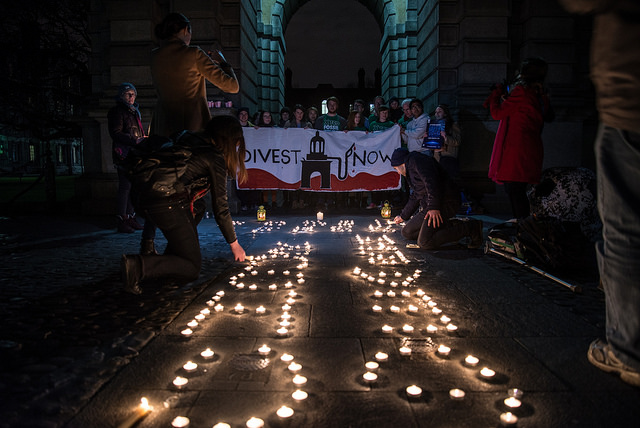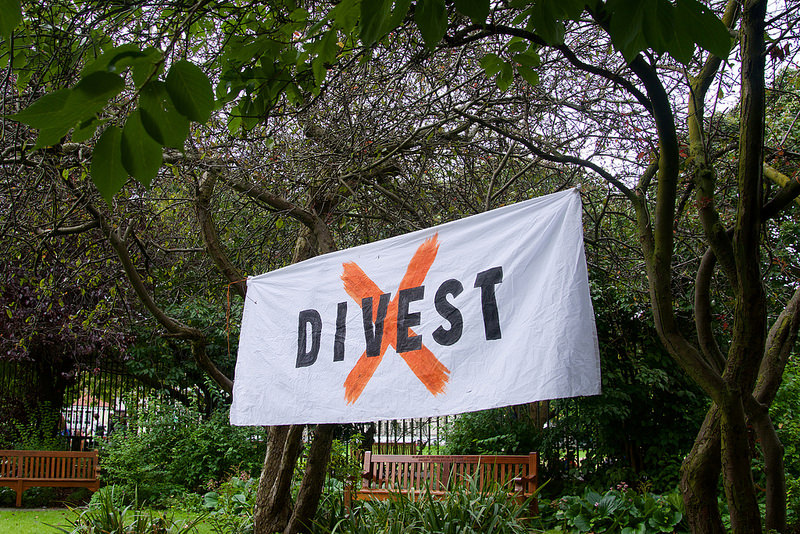Having most notably been used as a technique to help end apartheid in South Africa, divestment is not a new concept. It is one, however, that has really only recently been brought to the attention of many Trinity students. Last year, Fossil Free TCD rapidly stormed into the headlines and made both students and staff alike consider the concept of fossil fuel divestment. They have helped create a situation where Trinity is expected to soon announce its intention to divest the €6.1 million it currently indirectly invests in the fossil fuel industry.
Colm Tong, a third-year environmental science student, was one of the main initiators of the campaign in Trinity, having been inspired after attending a Fossil Free Skillshare gathering in Eindhoven, the Netherlands, in June 2015. Speaking to The University Times, Tong is quick to emphasise the importance of events such as these, stating that “meeting people, I think, is what makes it a lot more successful” because “when you’re in a big group like that, it’s easier to get enthusiastic and feel empowered to do something”.
Tong and other members of Fossil Free TCD also attended a four-day Summer Gathering in Oxford in July of this year, where they practiced campaigning skills and met other student activists from across the UK. This was organised by People & Planet, a student network in the UK, which supports student campaigning through training events like these. Speaking to The University Times, People & Planet’s Co-Director of Campaigns and Communications, Andrew Taylor, confirmed that although it has not yet been announced, “a quarter of UK universities have divested”. Like Tong, Taylor partly attributes this success to the use of regional and national gatherings: “It’s important for people to realise that they are part of a wider movement […] and can see the bigger national and global picture.”
The creation of an All-Ireland Student Activist Network is a testimony to the group’s ambitions to grow both this campaign and others on a national scale
While the organisation has supported Fossil Free TCD throughout, the students involved with the campaign felt compelled to create their own network across Ireland in order to create the same sense of community and solidarity here. This led to the All-Ireland Student Activist Weekend held in Dublin earlier this month. Speaking to The University Times about this process, Áine O’Gorman, Campaigns Manager of the Environmental Society and one of the founders of Fossil Free TCD, explained that after experiencing the power of co-ordinating activist groups at the People & Planet gathering, she asked herself, “why don’t we have this in Ireland?” and so set out to rectify that. The group is already planning another similar gathering in Dundalk in January.
It is clear when speaking to Tong and O’Gorman that their ambitions stretch further ahead from Trinity’s decision, though that is their immediate focus. Speaking to The University Times after a Fossil Free TCD campaign meeting in early October, Tong spoke of how he wanted to “use this as a springboard for other events”, and the creation of an All-Ireland Student Activist Network is a testimony to the group’s ambitions to grow both this campaign and others on a national scale. To take a recent example, this past Thursday saw the group urging students to contact their TDs and physically campaigning outside the Dáil to support the bill to ban fracking in Ireland, which successfully passed its first stage that evening.

As if their growing ambition isn’t clear enough, last Monday saw Fossil Free TCD collaborate with the Environmental Society and Global Development Society to screen The Burning Question, a documentary produced by Trócaire, an Irish charity aiding world development. Earlier this year, Trócaire launched a national divestment campaign, calling on the Irish government to commit to divesting the €72 million that it currently has invested in the fossil fuel industry. Speaking at the event on Monday, Joanne McGarry, Campaigns Officer at Trócaire, said: “We know that the Irish Strategic Investment Fund, which is where the money is invested, is going to be reviewed by the end of this year, so it’s really, really important that we keep the pressure on them.” When asked what impact a commitment to divestment from Trinity would have on their campaign, McGarry was fiercely clear: “It would send a massively positive message.”
As more and more institutions divest, the pressure on others to do so increases, as does public awareness, and so the campaign hopes to grow exponentially
Universities across the globe are paving the way for other institutions to follow. Taylor from People & Planet highlighted this, saying that “students have been the main driving force for fossil fuel divestment in the UK”, with a total of 42 university divestment “victories” soon to be announced. Whilst the campaign began in the US, it is in Europe that it has really exploded, with over 160 divestment commitments from various institutions in Europe, including the capital cities of France, Germany, Norway, Sweden and Denmark. In Europe alone, this already totals more than $4 trillion worth of fossil fuel stocks, according to a recent blog post by the Go Fossil Free campaign. As more and more institutions divest, the pressure on others to do so increases, as does public awareness, and so the campaign hopes to grow exponentially.
It certainly seems to be growing in Ireland at least, with O’Gorman mentioning talks of divestment campaigns being set up in University College Cork (UCC), NUI Galway (NUIG), University College Dublin (UCD) and Dundalk Institute of Technology (DKIT). One of the reasons given for the success of this campaign is the ease with which it can be adopted by various institutions, as a lot of resources are readily shared. Despite this, it is not always an easy experience. The fossil free campaign in Queen’s University Belfast began before Fossil Free TCD, yet has faced a huge amount of resistance from the university, provoking the students to undertake “direct action nearly every week” last year, as member Eugene Tinnelly tells The University Times. He goes on to describe the occupation of the university’s finance department in December 2015 as “the most significant moment in the campaign and probably in terms of activism at Queen’s in the last 10 to 15 years”. The tenacity of the Fossil Free QUB group shines through Tinnelly’s speech, as he confidently ensures that “if the response comes back no, there would definitely be more direct action taken against the university”.
This approach is reminiscent of the situation at the University of Edinburgh in May 2015, when, after the university announced that it did not intend to divest from fossil fuels, students occupied a university building for more than 10 days, leading to the eventual concession of the university that it would divest from coal and tar sands. It is stories like these that continue to inspire other student activists, such as those in Queen’s, not to give up. While Tong praises Trinity for being “really receptive” and “reasonable” so far, he does state that should the report reveal Trinity does not intend to divest, “we’d have to escalate in some manner”, in ways perhaps similar to those used by students at Queen’s and the University of Edinburgh.
This decisive student activism seems to be becoming ever more commonplace. Reflecting on the student engagement with the marriage referendum of 2015 and the recent marches for the repeal the eighth and students against fees campaigns, as well as the success of Fossil Free TCD, does there seem to be a growing culture of activism? Tong and O’Gorman both agreed that this appeared to be the case at least within Trinity, with Tong stating: “I do feel like there’s definitely a lot more campaigning and activism going on now than even two years ago.” With a smile, he goes on to think out loud: “That’d be pretty awesome if we started campaigning again, if there was that sort of culture.”
I do see student activism bubbling up again as climate change becomes more central. Universities are a key organising ground for political ideas and activism
Danielle Paffard, the UK divestment organiser at 350, the organisation which began the entire fossil free movement in 2013, weighed in on this from a broader vantage point, using the 2010 student demonstrations in the UK as another example of political engagement on a large scale in recent years. Speaking to The University Times, Paffard says: “I do see student activism bubbling up again as climate change becomes more central. Universities are a key organising ground for political ideas and activism, and I think the divestment movement has been good to just provide the tools and the ideas and the networks to do something that’s clearly a very effective campaign on a global stage.”
Paffard goes on to emphasise the valuable role that universities play in campaigns such as this, emphatically explaining that “the impact of a university divesting goes way, way beyond inside walls, and it’s such an important message because of who these universities are, especially somewhere like Trinity, which is a well-respected educational institute all around the world, and so for them to be taking a stand and distancing themselves from the fossil fuel industry and pointing a finger at a pariah industry is absolutely crucial”.
With more and more universities taking this step, it becomes perhaps even more essential that Trinity, as a well-respected educational institute, as Paffard puts it, joins those numbers. Paffard tells a fitting story: “When Nelson Mandela made his first trip over to America, the first place he called at wasn’t the White House, it was actually Berkeley to go and thank the students for their role in spearheading the divestment movement, which was a powerful international political force accompanying the absolute struggle and power of the internal South African resistance.” When Trinity makes a decision, we may find that the College proves pioneering, or that some of its most vocal students will decide to take further action.







